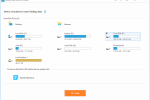Nowadays, life revolves around online encounters. The Internet is a powerful tool that enables education, socializing, and work. It is a powerful tool that allows users to shop on-the-go. Many people use mobile apps when making purchases from online retailers. Shopping has become increasingly social as consumers are able to share the products they like with friends and advertise their purchases within their social networks. However, there are some risks that go along with digital shopping and sharing habits. It is important for both consumers and the enterprises that accept online purchases to be aware of the pros and cons of social networking and digital purchasing.
The Rise of Social Media
Advances in technology are reducing the need for cash. While credit cards still serve as the primary means for purchasing, mobile apps with social networking capabilities are making it easier than ever to send and accept payment. Social networks are finding new ways to use things like crowdsourcing and ‘likes’ to promote products and garner popularity for goods and services. Businesses use the benefits of social media to locate untouched demographics and find new customers. Through adding social media incentives to purchase paths, businesses have the opportunity to expand their reach from a singular consumer to a consumer’s entire social network. While the convenience of making purchases, sharing money, and crowdsourcing products on social media is exciting, it also poses risks.

Enterprises that accept payments online and through social media need to be aware of the risks included on their platforms. It’s important to have a plan in place for security information and event management. This can help an enterprise to identify suspicious payment activity and allow them to respond in real time. Things like the emergence of multiple new accounts may indicate social media fraud. Any platform that is gathering personal data should have sophisticated data management systems in place so that the information that is being shared by users is secured and accounted for within a contained environment.
The Risks and Rewards
The ability to ‘share’ personal data, especially data about purchase history comes with risk. Recently, Facebook revealed that the private data of over 50 million users was compromised by a data firm called Cambridge Analytica. Many users were shocked to learn that their data was being used without their knowledge. While many social networks offer services that appear intimate and private, the data that users make available on these social networks opens them up to the possibility of fraud. This is especially true when users utilize social networks for online transactions.
Criminals can also use social media to scam their victims. By creating posts and ads on social media platforms to advertise fake opportunities, consumers can be lured into sharing their personal data without their knowledge. By asking for a user’s card number and PIN in exchange for access to fake opportunities, criminals can steal personal data by simply asking for it in a misleading way.
While personal data breaches are certainly a reminder of the inherent risks of today’s online society, social media is expanding how society interacts and opening new avenues of growth for many different industries. With the proper data handling in place, this growth will continue to provide benefits for both companies and consumers alike.























